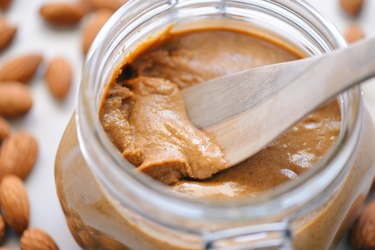
When you're fighting colon cancer, colon cancer nutrition can be a key part of your treatment success and long-term recovery. Here are the foods you should eat and the ones to avoid before, during and after your colon cancer treatment.
"Overall, individuals with colon cancer (as with many cancers) should aim to follow a healthful and balanced diet with an emphasis on fruits and vegetables, whole grains, lean proteins and healthy fats," says Alicia A. Romano, RD, LDN, a registered dietitian and nutritionist at Tufts Medical Center in Boston and national spokesperson for the Academy of Nutrition and Dietetics.
Video of the Day
Video of the Day
But more specifically, if you are having certain symptoms, your diet may shift temporarily.
Best Foods to Eat for Nausea
Per Mayo Clinic, your treatment will depend on the stage and location of your colon cancer and your overall health. Likely treatments include:
- Surgery.
- Radiation.
- Chemotherapy.
- Target drug therapy.
- Immunotherapy.
While everyone responds to these treatments differently, for many, chemotherapy and radiation cause diarrhea, Romano says.
If you have diarrhea, she says, you want to eat a low-fiber diet. This type of diet includes foods like:
- White bread.
- Pasta.
- White rice.
- Vegetables that are well-cooked.
Read more: List of Easily Digestible Low Fiber Foods
Eat Smaller Meals Throughout the Day
That said, when you are undergoing colon cancer treatment, you may not feel much like eating, so you may find you're better able to tolerate foods if you eat little bits at a time, Romano says.
To best navigate your appetite, plan smaller bites throughout the day rather than bigger meals for breakfast, lunch and dinner, she says.
Foods to Avoid
Romano says you want to avoid these foods, particularly if you have diarrhea from your cancer treatment:
- Vegetable skins and seeds.
- Gas-causing vegetables (beets, broccoli, Brussels sprouts, cabbage).
- Whole-grain breads and cereals.
- Dried beans and legumes.
- Corn.
- Seeds.
- Nuts.
But while nuts themselves are a no-no, "smooth peanut butter or smooth nut butters are OK and are a good source of protein — which you want lots of," Romano says.
Limit Dairy
You may find your treatments make you lactose-intolerant (meaning your body can't digest the sugar found in milk — aka lactose), Romano says.
Lactose intolerance can also cause diarrhea, as well as bloating, gas and cramps, in which case you will want to add dairy products to your list of foods to avoid, Romano says.
Reduce or Avoid Alcohol
Beyond dairy, you also want to limit the amount of alcohol you drink, Romano says.
The American Cancer Society (ACS) offers several reasons why you may want to limit or avoid alcohol, as alcohol may:
- Irritate your mouth if you have mouth sores as a side effect from cancer treatments.
- Affect your risk of developing a new cancer if you have already been diagnosed with cancer.
- Interact with certain cancer treatment drugs, upping your risk of side effects.
Skip the Sweets
Most sweets like cakes, cookies, doughnuts and the like are just empty calories that provide none of your much-needed nutrition, Romano says.
So if you're craving something sweet, restrict yourself to small portions, she says, as too many sweets can lead to weight gain — and it's important for you to maintain a healthy weight when you're undergoing your treatment.
On that note, a trial of more than 1,000 people, described in the February 2019 issue of the Journal of the National Cancer Institute, examined the role of diet in stage 3 colon cancer patients after they had surgery to remove their tumors. Those who followed a diet heavy in foods that spike blood sugar (aka high-insulinogenic diet) had a higher risk of cancer recurrence and death.
According to National Institute of Diabetes and Digestive and Kidney Diseases, foods that spike blood sugar include:
- Some carbohydrates.
- Fried foods.
- Foods high in saturated or trans fats, or sodium.
- Sweets (baked goods, candy, ice cream).
- Sweetened drinks.
Stay Hydrated
While you're avoiding certain foods and probably not eating very much, be sure you don't skimp on fluids, Romano says.
Your body can't work efficiently if you're dehydrated, according to the ACS, which recommends you get more fluid by:
- Keeping a record of your food and fluid intake.
- Drinking fluids (iced fluids may be easier for you to consume).
- Eating fluid-rich foods like fruits, vegetables, soups, gelatins and ice pops.
- Sucking on ice chips.
- Keeping a small cooler near you and stocking it with
drinks for easy access.
- Alicia A. Romano, MS, RD, LDN, CNSC, registered dietitian and nutritionist, Tufts Medical Center; national media spokesperson, Academy of Nutrition and Dietetics, Boston
- Mayo Clinic: “Colon Cancer: Diagnosis & Treatment”
- American Cancer Society: “Alcohol Use and Cancer”
- Journal of the National Cancer Institute: “Dietary Insulin Load and Cancer Recurrence and Survival in Patients With Stage III Colon Cancer: Findings From CALGB 89803 (Alliance)”
- National Institute of Diabetes and Digestive and Kidney Diseases: “Diabetes Diet, Eating, & Physical Activity”
- American Cancer Society: “Dehydration and Lack of Fluids”
Is this an emergency? If you are experiencing serious medical symptoms, please see the National Library of Medicine’s list of signs you need emergency medical attention or call 911.